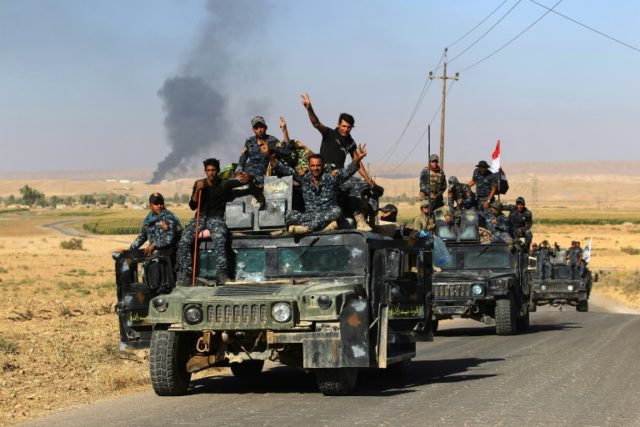Members of Iraq’s Iran-backed Popular Mobilization Forces (PMF/PMU) confirmed on Monday that Islamic State (IS/ISIS) terrorists killed “at least 27” of their fighters and kidnapped about two dozen more near Kirkuk, a city the PMF invaded and conquered late last year.
Kirkuk previously fell under the control of Kurdish Peshmerga forces. Though not traditionally a part of Iraqi Kurdistan, the Peshmerga entered Kirkuk after Iraqi forces fled the city upon being attacked by the Islamic State in 2014. The Iraqi military, now aided by the PMF, invaded Kirkuk last year in retaliation for the Kurdistan Regional Government (KRG) of Iraq holding a non-binding referendum on independence.
The Peshmerga left the city after their main ally, the United States, refused to defend them. While the absence of Peshmerga in Kirkuk could invite an ISIS presence, and the Trump administration claims to prioritize the fight against the Islamic State as its top concern in the Middle East, President Donald Trump vowed not to “take sides” between the Iran-backed PMF militias and longtime U.S. allies the Peshmerga.
Now, four months after the PMF took over Kirkuk, the Islamic State have returned. The Associated Press reports that ISIS terrorists killed at least 27 PMF fighters in a village in Hawija, Kirkuk province, on Monday. ISIS terrorists reportedly disguised themselves in Iraqi army uniforms and established a fake checkpoint on a road the PMF, stopped a PMF convoy, and opened fire. Reports indicate that the Islamic State took 20 of the men in the convoy hostage initially.
The Kurdish outlet Kurdistan 24 adds some detail, saying, “The statement posted on the PMF website mentioned that IS has taken advantage of the poor weather conditions in the area to set up a fake checkpoint and donned police uniforms to stop the convoy.”
The PMF have blamed the attack on ISIS “sleeper cells,” implying that the terrorists are in hiding and thus difficult to neutralize before they strike.
By Monday afternoon, various outlets reported that the terrorists had executed the PMF fighters taken hostage. A Kirkuk police official confirmed to Turkey’s state-run Anadolu news agency that ISIS “killed all the Hashd al-Shaabi fighters who had been captured earlier following clashes.” The Islamic State dumped the bodies of those killed near the location of the fake checkpoint. Kurdish outlet Bas News notes, however, that not all the men in the PMF convoy have been accounted for, suggesting that they may still be held hostage or their bodies were left in another location.
Anadolu cites the official as stating that ISIS also ran off with “several military vehicles and large amounts of ammunition.”
ISIS terrorists began threatening Kirkuk the day after the Peshmerga left Kirkuk. Islamic State jihadis attacked two villages in Kirkuk province almost as soon as the Baghdad invasion began, after years of failing to take the city over under the Kurds. The Iraqi government alleged that invading Kirkuk was necessary in the aftermath of the non-binding independence referendum held by the KRG, claiming that polling locals in Kirkuk about an independent Kurdistan was an insult to the Iraqi nation. Kirkuk is an ethnically diverse city of Arabs, Turkmen, and Kurds, and the KRG, based in Erbil, insisted the vote was little more than an opinion survey.
A week ago, Kirkuk Governor Rakan al-Jabouri made a public warning suggesting that an Islamic State attack was imminent, urging a “new military operation” against the group.
Since the PMF took over Kirkuk, Kurds have repeatedly protested that Iraqi forces have begun an ethnic cleansing campaign to “Arabize” the area. Kurdish officials estimated that 100,000 people, most Kurds, fled Kirkuk in the immediate aftermath of the invasion, and that PMF fighters immediately began looting and burning down Kurdish homes. A video surfaced during the colonization of the city showing a man identified as a PMF fighter hanging a photo of Iran’s Supreme Leader Ayatollah Ali Khamenei in a Kirkuk government building.
Al-Jabouri, the governor, reportedly “asked Iraqi security forces to take necessary measures to oust the residents in Kirkuk’s Kurdish-populated neighborhoods of Nawroz and Kurdistan from their houses” in late January, suggesting that the forced removal of Kurds from the city continues. The Kurdish outlet Rudaw also reported that the Iraqi-sponsored Kirkuk government has ceased policing some neighborhoods, causing a rise in crime and pressing Kurdish residents to leave.
“Kurds feel unsafe going out at night, fearing theft, killing, or abduction, Rudaw discovered,” the report reads.
While standing accused of a variety of human rights violations, Iraq formally declared the PMF a wing of the Iraqi military last year in anticipation of the liberation of Mosul from the Islamic State. Baghdad had initially promised that only Iraqi military, not independent Shiite militias, would enter Mosul.
The PMF have become a problem even for Baghdad, however, as reports indicate they have turned against Iraq’s legal army. Citing the publication Al-Araby Al-Jadeed, Bas News reported that heads of a variety of PMF militias have attempted to pressure Baghdad into giving them classified intelligence, outraging Iraqi military officials.

COMMENTS
Please let us know if you're having issues with commenting.